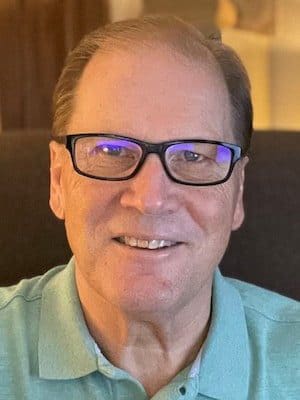I had the privilege to grow up in a white family of Baptists in the 1950s and 1960s, which had a commitment to racial justice and civil rights.
My parents and my grandparents understood that God loved every person and that their Christian faith demanded justice for everyone.
My father’s parents, Oscar and Verna Hill, made a personal commitment to stay in their community and their church during the racial transition and white flight in Kansas City, Missouri.
In fact, their church was the only congregation from a Southern Baptist tradition in the city to complete a full racial transition without losing continuity, relocating or selling their property to an African-American congregation.
When my grandfather died, our family was almost the only white people present at the funeral. It was a church my grandparents loved, and it was a congregation that loved and took care of them.
My commitment to racial and social justice did not begin with me. It began with a family that believed in the dream Martin Luther King Jr. called us all to share.
In his famous “I Have a Dream” speech on the steps of the Lincoln Memorial, King referenced the Emancipation Proclamation Abraham Lincoln signed “as a great beacon light of hope to millions of Negro slaves who had been seared in the flames of withering injustice.”
But he also acknowledged that, “one hundred years later, the Negro still is not free.”
Regardless of your politics, all Americans have to acknowledge that the election of Barack Obama as the 44th president of the United States was a historic moment. It meant we had moved down the road toward the realization of King’s dream.
However, it is equally true that Obama’s election resulted in a spike of growth among white supremacist and other hate-filled organizations. Many of these groups saw his election as an opportunity to recruit and expand their movement.
The election cycle this past year has made it clear that America has not dealt with our “original sin” in a meaningful way.
Jim Wallis wrote a magazine article in 1987 titled, “America’s Original Sin: The Legacy of White Racism.” In his article, he stated, “America was founded upon a legacy of white privilege through the near genocide of one race and the enslavement of another.”
Wallis rightly made racism a faith issue. He says it is an issue more churches and religious institutions need to become involved in and help to eradicate.
One of King’s most famous quotes is that he was ashamed and appalled “that 11 o’clock on Sunday morning is one of the most segregated hours … in Christian America.”
Sadly, almost 50 years later that is still true. When will the American church have the courage to lead our nation to have an honest conversation about race?
King is best known for his role in the advancement of civil rights using nonviolent civil disobedience based on his Christian beliefs.
The civil rights movement that he led between 1955 and 1968 included acts of nonviolent protest and civil disobedience. These acts produced crisis situations, productive dialogues and the passage of several major pieces of legislation.
The Civil Rights Act of 1964, which banned discrimination based on race, color, religion, sex or national origin in employment, ended unequal application of voter registration requirements and racial segregation.
The Voting Rights Act of 1965 restored and protected voting rights for minorities. The Fair Housing Act of 1968 banned discrimination in the sale or rental of housing.
The tragedy is that even with these changes and a number of others, our nation has still been unwilling or unable to have an honest conversation about race and our original sin. We still live with injustice.
Incredibly, people of faith have sometimes even been a barrier to these conversations.
One of my favorite passages from King’s speech is “I have a dream that one day on the red hills of Georgia, the sons of former slaves and the sons of former slave owners will be able to sit down together at the table of brotherhood … I have a dream that my four little children will one day live in a nation where they will not be judged by the color of their skin but by the content of their character.”
I have a dream, too.
I have a dream that one day the people of God – the church – will start acting like the church. I have a dream that one day white Christians will have the courage to lead a nation to have an honest conversation about racism and white privilege. I have a dream that conversation will lead our nation to begin to heal.
What better way is there to celebrate Martin Luther King Jr. Day?
Jim Hill is executive director of Churchnet and a board member of Missouri Faith Voices.
Editor’s note: This article is part of a series about local churches and associations participating in MLK Jr. Day observances and engaging in racial reconciliation initiatives.
Previous articles in this series are:

